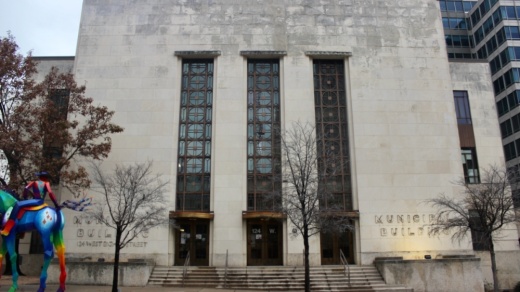The rehabilitative court, or DACC, mainly handles cases involving those experiencing homelessness and offers additional support services on top of its legal work. The court was previously housed at two spaces downtown before moving into its current, temporary home in One Texas Center at South First Street and Barton Springs Road last summer.
The city-owned tower was never envisioned as the DACC's permanent location, and consideration of other long-term placement options has been ongoing for months. Austin's old municipal building located at 124 W. Eighth St. was identified as a possible landing spot for the court last year—pending an estimated $27 million in renovations. Despite those needed upgrades, the city views the century-old landmark civic building as its preferred landing spot for the court and other city offices.
"The municipal building is ideal for the DACC because it is located central to its downtown area jurisdiction, provides ample space for its operations, has immediate access to a transit line and the renovation can be completed within the required timeline," financial staff said in a city document.
Some downtown residents and officials have expressed reservations about the location and the timing of the plan. Council's vote to approve the move was pushed off last month, and a community meeting about the proposal was held in the weeks since. However, community members speaking at a Feb. 11 meeting of DACC's advisory board said they feel their concerns have yet to be addressed while the city forges ahead.
“It seems like the city’s kind of gone in blind and deaf, but ... determined to make this move without what I would consider any of the due diligence being performed," resident Chris Harshbarger said.
Citizens raising concerns to the DACC board and during the earlier community meeting pointed to unanswered questions related to public health, security and the possibility of court clients temporarily sleeping in or around nearby buildings.
“We’re not questioning the importance of the DACC. Not at all. But we are asserting that placing the DACC at the heart of this community is both disruptive and abusive to the community and doesn’t benefit neither us, the residents, or the homeless," area resident Hanan Levy said. "The process through which this is attempted is really inherently flawed.”
The Downtown Austin Alliance area advocacy organization previously asked to delay a decision on the move, and in a Feb. 10 letter to council the group said it now officially opposes the relocation.
"The fact that there has been no community engagement to determine the most appropriate use for 124 W. Eighth St., or on the best location for Community Court, cannot be overlooked," said Dewitt Peart, president and CEO of the Downtown Austin Alliance. "City Council’s approval to permanently locate Community Court in this facility without an open and transparent process would contradict the city of Austin’s practice of engaging its citizenry in decisions that ultimately affect the community that Community Court was created to serve."
Votes to approve and fund the DACC's relocation and municipal building renovations could take place at council's Feb. 17 meeting.
Expanding jurisdiction
The court is also facing questions of its jurisdiction in the wake of recent local and state policy updates related to people experiencing homelessness.
The DACC has been responsible for handling cases involving violations of Austin's Proposition B ordinances aimed at public camping and sitting, sleeping or lying down as enforcement ramped up through 2021. The court is also looking to clarify its responsibilities in relation to House Bill 1925, a new law banning public camping statewide.
Assistant City Attorney Jaclyn Gerban told the DACC board Feb. 11 that the city is eyeing two possible code updates that could cement the court's role in homeless ordinance enforcement as well as potentially expand its purview citywide.
The first possible code change would completely remove the court's geographic boundaries—currently limited to portions of downtown, East Austin and West Campus—while specifying the DACC's responsibility for cases involving Proposition B and HB 1925 violations.
“The first amendment would expand the geographical jurisdiction a lot more. ... The budget would probably have to be redone in order to be able to offer services to everyone that that would apply to," Gerban said.
Under the second, which Gerban said would be easier in the short term, the new offenses would be codified, but the DACC's boundaries would not yet change while leaving the door open for future growth.
"The second amendment would allow for, in years, for the budget to grow ... and be able to meet the needs of what that first amendment would do," she said.
Faced with a choice between sizable changes to the court's operations and budget and a smaller adjustment to city code, the DACC board declined to make a final decision Feb. 11. Gerban said the city hopes to push a code update forward for council consideration in the near future, but board members and staff with Austin's homeless strategy office, municipal court and public health authorities will likely discuss the issue before a recommendation from the DACC board is made.





